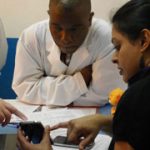This blog post is part of PHR’s Tech & Human Rights Blog Series. The series is meant to highlight the intersection between technology and human rights, and examine the increasing role that technology can play in advancing human rights around the world.
A few months ago, I was fortunate enough to travel to the Democratic Republic of the Congo (DRC) to pilot a new tool in the fight against sexual violence in conflict. In my capacity as the MediCapt project manager, I field tested the mobile application MediCapt v2.0 – a new and improved version of MediCapt – with our clinicians in the DRC. In a nutshell, MediCapt is a concept that emerged from one of the initial field assessments through the Program on Sexual Violence in Conflict Zones at Physicians for Human Rights (PHR); this mobile app digitizes the collection and documentation of sexual violence evidence and preserves it for future court prosecution.
What, in effect, PHR is trying to do is leverage the wide-ranging possibilities of technology to leapfrog certain sectors within these low-resourced communities into the digital age. We have all heard that the possibilities of technology are endless. Mindful of the fact that technology is rights-neutral, we know it has the ability to alleviate some of the burdens placed on these communities. For example, in the DRC, technology can circumvent some of the logistical hurdles faced on the ground in tangible ways. The extreme physical distances that a sexual violence survivor must traverse to seek justice can be daunting as she makes her way from the police station to a health care facility for a proper forensic medical exam; the long, oftentimes solo, journey that the survivor must make can be at great cost to herself, both monetarily as well as physically. The evidence obtained by the health care worker must then make its way from the hospital to the police station, and then to the prosecutor, and ultimately to the courtroom. All the while, the evidence must be able to withstand legal scrutiny of chain of custody – in other words, it must be clear that the evidence has not been altered or tampered with in any manner.
And that’s only the tip of the iceberg in collecting evidence of sexual violence in the DRC. Hospitals and police stations often lack the proper resources to conduct exams and investigations, including the very basics of pen and paper. And if multiple copies of a forensic medical exam record are needed, they are often painstakingly done by hand. Moreover, most hospitals and police stations do not have locked cupboards to securely store evidence making chain of custody even harder to establish. Thus, it is no wonder that many sexual violence cases fail in this region for want of forensic medical evidence.
While certain logistical barriers will remain, MediCapt offers the opportunity to use technology to limit hurdles presented by the poor roads, the long distances between police stations and health centers, the absence of pens and paper, and compromised chain of custody. With PHR providing some basic startup materials – such as hardware like smartphones and printers – clinicians, police officers, prosecutors, and judges will have the resources to properly and efficiently document sexual violence. If we are able to instantaneously document, collect, and preserve forensic medical evidence on a mobile device and use technology to transmit such evidence between medical centers, police stations, and courtrooms, there is a greater likelihood that the evidence will see the light of day in court and will be used to support prosecutions of sexual violence.
Perfecting the paper trail to seek justice has been an ongoing problem in the DRC. MediCapt provides a concrete opportunity to use technology to overcome the gaps that paper presents. While technology is not a panacea to all of the challenges hindering these cases in the DRC, it can offer a significant step forward for survivors of sexual violence in attaining justice.

